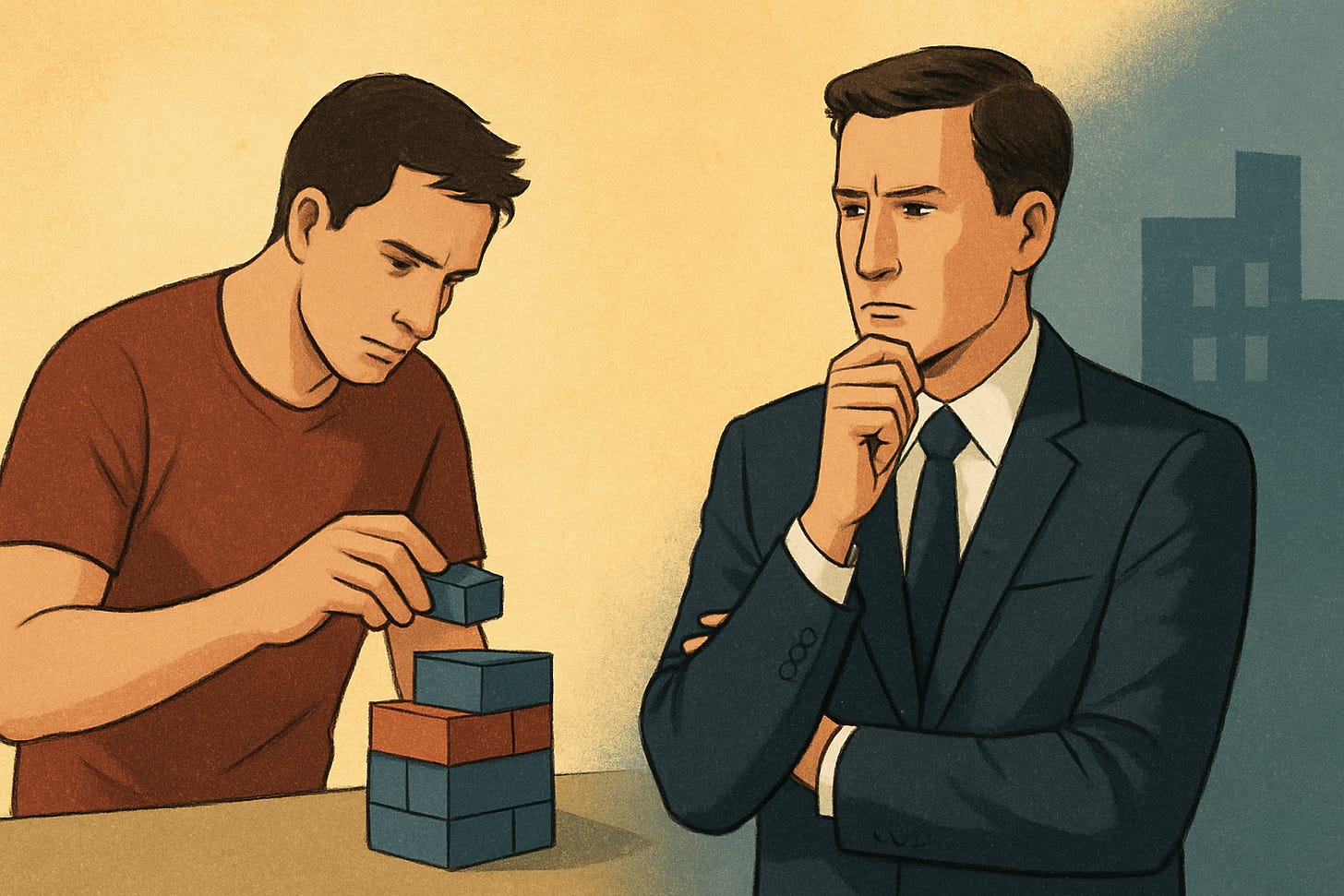From Builder to CEO
Why most founders fail the transition from builder to CEO: the hidden identity crisis boards ignore, quietly fracturing people and destroying start-ups more than markets ever could.
Every founding myth begins in a garage, or at least that’s how the story is told. Two obsessives, one laptop, a half-built prototype, and enough caffeine to kill a horse. The energy in those early days is feral: it’s about building fast, improvising faster, and living entirely inside the product. Nobody cares about HR policies, quarterly reports, or the board deck — the only thing that matters is getting something to work before money runs out.
But then, almost imperceptibly, the job changes.
The same founder who once wrote code at 3 a.m. is now expected to approve expense policies, manage HR disputes, attend investor dinners, and field questions about EBITDA margins. The role mutates from building to managing, from hacking to leading. And while this shift sounds like growth, for many founders it’s the beginning of the end.
Most start-ups don’t implode because of markets or competitors. They unravel because the founder who thrived in chaos is suddenly asked to operate like a professional CEO.
Boards assume it’s a natural progression, as if entrepreneurship were just a junior version of management. In reality, it’s more like asking a jazz musician to suddenly conduct a symphony — technically adjacent, but spiritually alien.
This is the kill switch built into modern start-ups: the identity shift from builder to CEO.
It’s not just a question of skills or experience; it’s a question of who the founder is. The very traits that fuel invention — obsession, control, tunnel vision — can prove fatal in the boardroom.
Few survive the crossing. Most don’t even know they’re standing at the edge of it.
And yet, we rarely talk about it. Success stories flatten the transition into a footnote. Failures are chalked up to “bad execution” or “market headwinds.”
What goes unspoken is that the founder didn’t just run out of cash; they ran out of self.
In this issue of The Founder's Brew, we confront the most dangerous inflection point in a founder’s journey: the forced transition from scrappy builder to corporate CEO. It sounds like growth, but more often it’s rupture. Boards underestimate the identity shock, teams misread the signals, and founders themselves rarely survive intact. This essay dissects why the shift destroys more companies than competition ever does — and why we still refuse to call it what it is.
🚀 Today’s Issue at a Glance
The Myth of the “Natural CEO”
Builder Energy vs. CEO Energy
The Control Problem
When Boards Look Away
The Rare Survivors
Welcome to The Founder’s Brew, 🔒subscribers-only🔒 offering by The Percolator dedicated to entrepreneurs & start-up enthusiast. Each week we share tools, resources and insights to help you grow in your founder journey.
🚀
Now, you can Upgrade your Subscription for Free when you Invite your Friends to Subscribe to The Percolator
At the heart of every start-up lies a paradox. The founder who sparks a company into existence is rarely the same person required to keep it alive.
In the earliest phase, survival depends on invention: hacking together a product, spotting opportunities before competitors, and living in a state of creative chaos. This identity — the builder — thrives on improvisation and total immersion. Nothing is too small to obsess over; everything is fuel for momentum.
But growth rewrites the script. Once a company gains traction, investors and employees begin to demand something altogether different: predictability, process, leadership. Suddenly the founder’s role stretches beyond code commits or product tweaks. They are asked to become a chief executive. Not simply in title, but in posture: someone who delegates, who sets culture, who holds teams accountable without burning them out. The demands shift from “make something work” to “make an organisation work.”
→ This is where many founders stumble.
The very behaviours that made them indispensable — control, speed, intuition — become liabilities in the new environment. An engineer-turned-founder might resist hiring senior managers because no one can match their obsession with detail. A product-obsessed visionary may dread the administrative grind of board meetings and financial reviews. The job they once loved has morphed into something almost unrecognisable.
→ Boards and investors often misjudge the transition.
The assumption is that passion will carry the founder across the chasm. But passion does not translate into people management, nor does technical brilliance guarantee organisational competence. Harvard’s Noam Wasserman has shown that nearly half of founders are pushed out by the very boards that once backed them — not because their product sense dulled, but because their leadership failed to mature in time.
Case studies litter the landscape. Travis Kalanick at Uber, whose aggressive builder’s mindset eventually collided with the responsibilities of governance. Adam Neumann at WeWork, whose charisma powered growth but could not withstand scrutiny of operational discipline. Even more disciplined founders, like Evan Spiegel at Snap, endured years of painful adjustment before stabilising.
The question is not whether founders can become CEOs. Some do, spectacularly. Jeff Bezos, Bill Gates, and Mark Zuckerberg each endured brutal public learning curves before settling into the role. The deeper question is what the transition demands of identity.
A builder constructs, tinkers, experiments. A CEO orchestrates, delegates, abstracts.
To ask one person to shed one skin and assume another is not merely a promotion. It is a transformation — one that often proves too much for a human being to bear.
🚀
Keep reading with a 7-day free trial
Subscribe to The Percolator to keep reading this post and get 7 days of free access to the full post archives.



